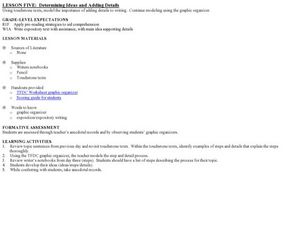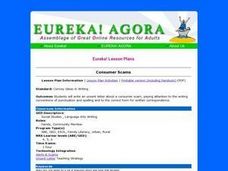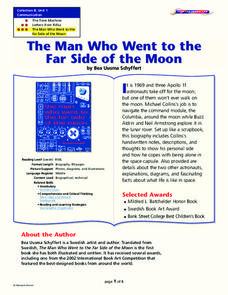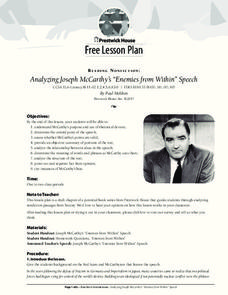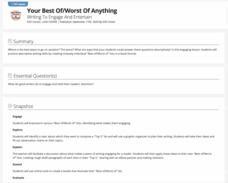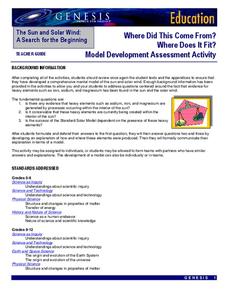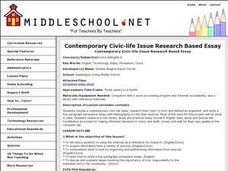Bright Hub Education
Using Evidence and Supporting Details in Writing
In expository writing, it is important to back up claims with evidence and details. Help your class to develop their writing with notes on different types of evidence. Once they have the basics down, practice with a sample thesis and...
EngageNY
Research: Identifying Categories for Our Research About the Wheelwright
Here is a fine lesson plan on reading and understanding expository text designed for 4th graders. With a partner, learners read a passage of text about a machine called a wheelright. This machine was commonly used in the colonial period....
Curated OER
Determining Ideas and Adding Details
A handy TFDC (topic/fact/detail/conclusion) graphic organizer (included) allows young writers to outline and record their main ideas and supporting details in the prewriting phase. They then continue to add details to the topic sentences...
Curated OER
Convey Ideas in Writing
Use the platforms of the 2004 presidential candidates to bring persuasive writing to your class. Young voters identify the three issues most important to them in the election and research the issues and candidates' positions. They write...
Curated OER
Persuasive Writing
Use a quick bell-ringer to interest your class in the art of persuasion. They brainstorm where they find examples of persuasion in their lives and identify who is trying to persuade them. Then they either fish through magazines or look...
Curated OER
Stars and Stripes Forever: Flag Facts for Flag Day
Students are introduced to the symbolism of the flag of the United States of American. They identify flag components, history, etiquette and lore. They also use constrution paper to make a flag and discuss the Pledge of Allegiance.
Curated OER
Determining Author's Point of View: The Sneeches
Determine the author's point of view in a text. Young readers read Dr. Seuss' The Sneeches and identify the author's purpose in the story. They identify persuasive techniques in writing, asking and answering questions to better...
Curated OER
The Man Who Went to the Far Side of the Moon
Practice comprehension skills using the story, The Man Who Went to the Far Side of the Moon by Bea Uusma Schyffert. Learners answer questions, fill out graphic organizers, and engage in extension activities involving writing and...
Curated OER
Telling Our Stories of Giving - Writing to Persuade
After identifying the parts of a persuasive piece of writing, young writers explore different prewriting activities for the persuasive essay. They have the option to write a news article, personal narrative, or persuasive essay to...
Prestwick House
Reading Nonfiction: Analyzing Joseph McCarthy's "Enemies from Within" Speech
Looking for a lesson plan that teaches class members how to analyze nonfiction? Use Joseph McCarthy's famous "Enemies from Within" speech as a instructional text. Worksheet questions direct readers' attention to the many historical...
Museum of the Moving Image
Evaluating Information: Focus on the 2008 Election
Just how true is the information contained in political ads? Determining the veracity of campaign ads from the 2008 presidential race is the focus of a instructional activity that introduces class members to several fact-checking resources.
Mathematics Assessment Project
Identifying Similar Triangles
Math whizzes work with angle sums and exterior angles to figure out the measure of other angles. This particular publication provides comprehensive support in the form of an anticipatory activity, questions designed to prompt discussion,...
Curated OER
Using Details from Text to Identify Author's Purpose
Explore writing techniques by analyzing newspapers and magazines with middle schoolers. They will collaborate in small groups to read local news stories and identify the main ideas and author's intent. They also utilize an information...
Curated OER
Teacher of the Year
Now is the time to identify the great teachers in your school! Discuss the characteristics of persuasive writing and analyze an example. Then, each pupil chooses a teacher who they feel should be named teacher of the year. They plan and...
Curated OER
Reading Strategies: Main Idea
Identify the main idea and the supporting details of a story in a literacy resource from Discovery Education. Complete with procedures, vocabulary, and assessment activities, this is a great way for pupils to practice their outlining...
Pennsylvania Department of Education
Analyzing Key Ideas and Details in Nonfiction
Students explore nonfiction texts. In this language arts instructional activity, students read a nonfiction text and make predictions. Students identify facts and opinions in the text and draw conclusions as they read.
K20 LEARN
Your Best Of/Worst Of Anything: Writing To Engage And Entertain
It was the best of places! It was the worst of places! Middle schoolers practice their descriptive writing skills by creating an e-book about the best of/worst of topics. A series of activities about descriptive writing and worksheets...
Curated OER
Teaching Summarization
Examine the process of summarizing a piece of text using the book So You Want to Be a President? Kids review the definitions for main idea, topic sentences, superordinate terms, and supporting details. Next, they work in small groups to...
Media Education Lab
Propaganda Techniques
In an age of fake news, alternative facts, and biased reporting, it is more important than ever that 21st century learners develop the critical-thinking skills necessary to recognize, analyze and resist the propaganda techniques used in...
NASA
Model Development Assessment Activity
Time to show off what they've learned! The final lesson in the series of six asks young scholars to process their learning from the previous lessons. They identify possible elements of the sun as well as a possible origin.
Curated OER
Elaborating the Main Idea, Using Supporting Details
A desk is used as a visual analogy to construct the main idea and supporting details in a story. The top of the desk is the main idea, and each of the four legs provides supporting details. The legs of the desk provide support for the...
Curated OER
Contemporary Civic-life Issue Research Based Essay
Seventh graders write a five paragraph persuasive essay on a contemporary civic-life issue.
California Academy of Science
The Heat is On: Cause and Effect and Climate
The higher the number of letters in the final word for the National Spelling Bee, the higher the number of people killed by venomous spiders. Obviously, those two facts correlate, but no causation exists. Scholars view data based on...
Curated OER
All About Penguins
Second graders research penguins. In this all about penguins lesson, 2nd graders identify facts from their readings and write an expository paper using proper capitalization and punctuation.




